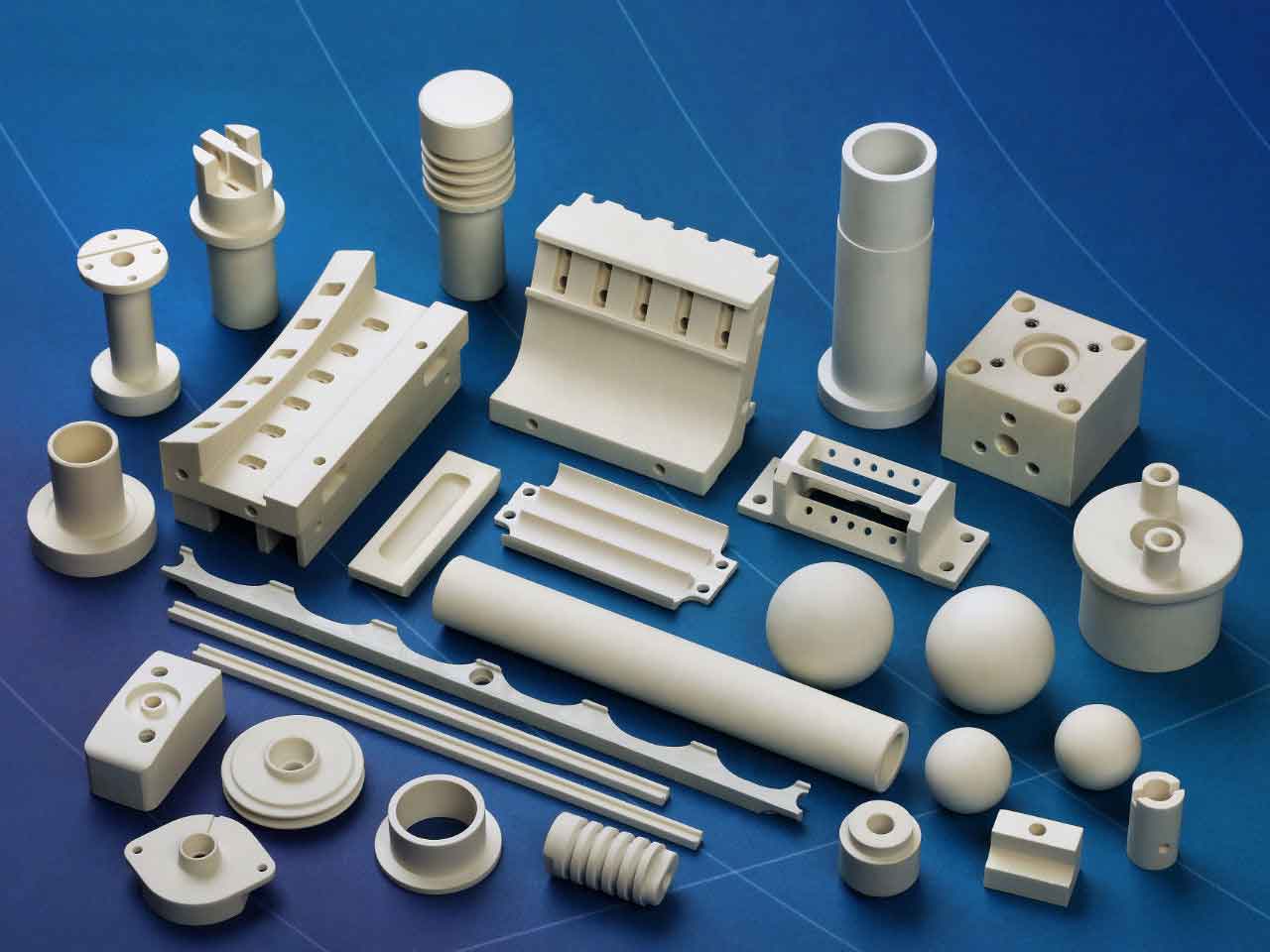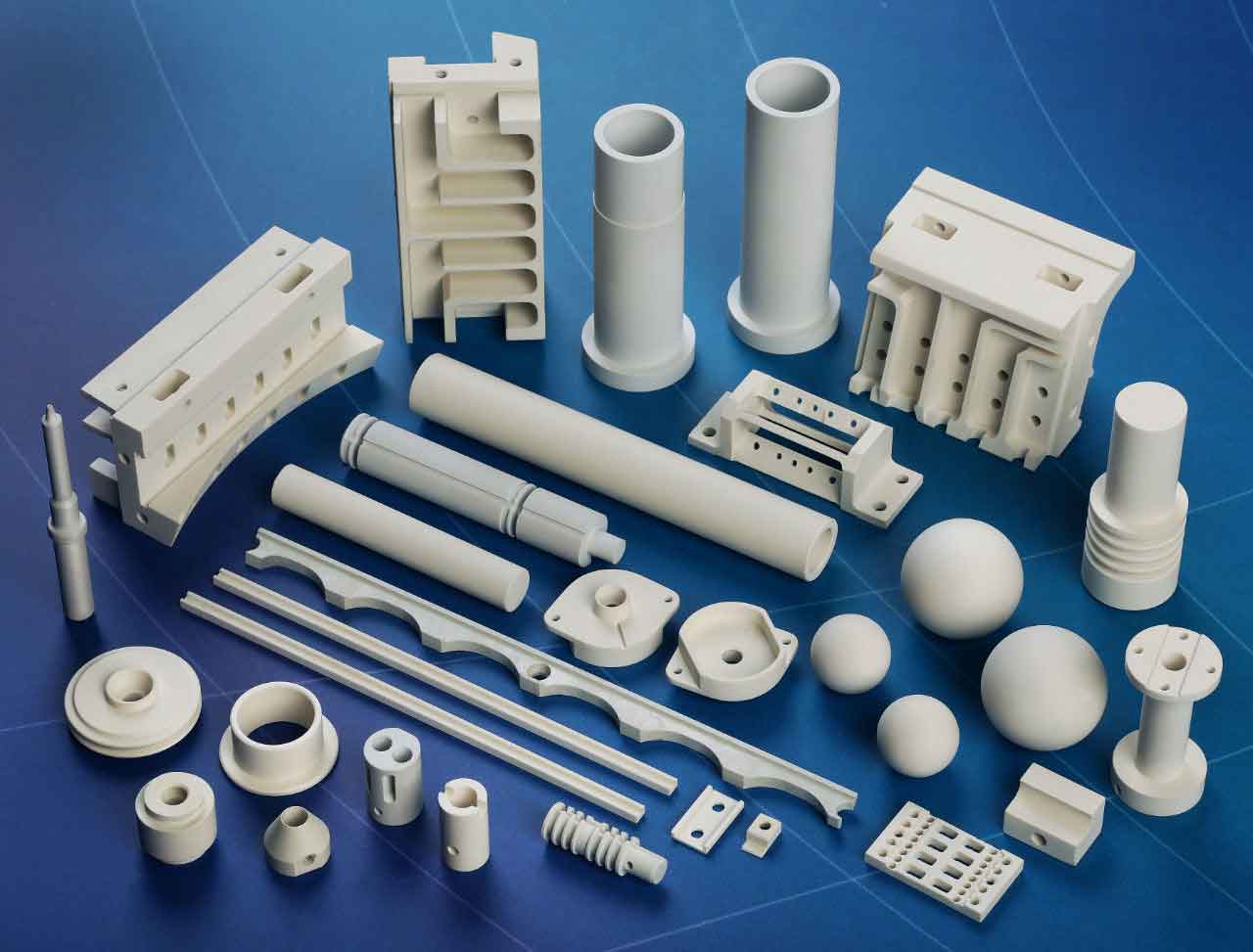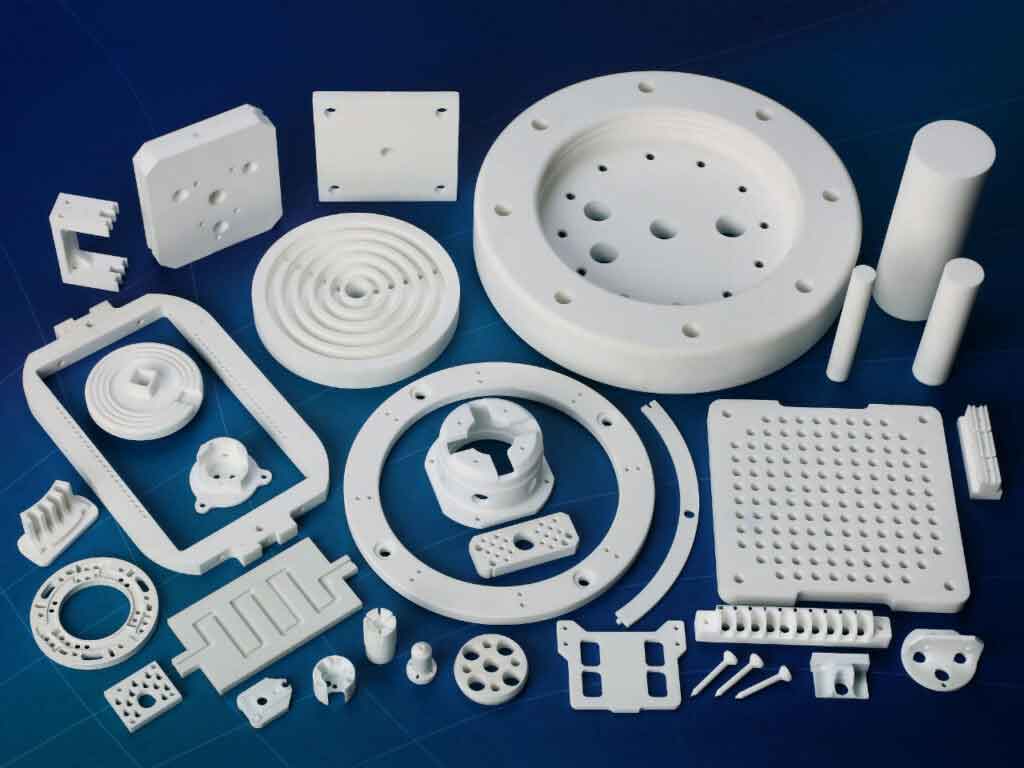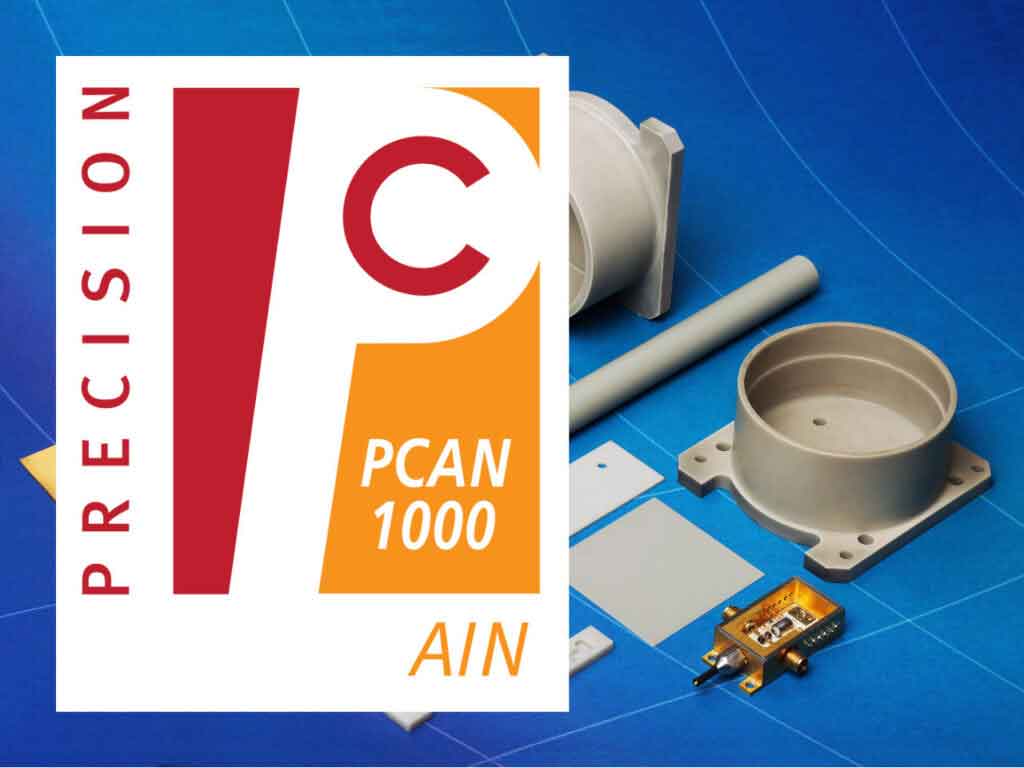Shapal Hi M Soft™ – Machinable Aluminum Nitride (AlN)
Material Advantages
- Excellent Machinability – Shapal Hi M Soft can be machined by a broad range of methods such as drilling, turning, and milling to form high precision complex shapes
- Excellent sealing ability to vacuum
- High thermal conductivity – approximately 4 times as much thermal conductivity as that of alumina (aluminium oxide)
- High mechanical and bending strength comparable to that of alumina
- Transparency – allows visible infra-red light to pass through easily
- Excellent electric insulation
- Low thermal expansion, close to that of silicon
- Low dielectric loss
- High corrosion resistance – non-wetted by molten metals
- Ultra high purity – does not contaminate molten metal even at high temperatures
Applications
- Electronic components where electrical insulation and heat dissipation are required
- Components where low dielectric constant and dissipation factor are required
- Vacuum components
- Parts and components where a low coefficient of thermal expansion is required
- Heat sinks
- Crucibles for vacuum deposition
- Special refractory parts such as protective tubes
Material Properties
Mechanical Properties
Density
Unit
Value
Young's Modulus
Unit
Value
Poisson's Ratio
Unit
Value
Compressive Strength
Unit
Value
Bending Strength @ -100C
Unit
Value
Bending Strength @ 25°C
Unit
Value
Bending Strength @ 500°C
Unit
Value
Bending Strength @ 1000°C
Unit
Value
Vickers Hardness (Hv) 25°C
Unit
Value
Thermal Properties
Maximum Oxidizing Temperature
Unit
Value
Maximum Inert Temperature
Unit
Value
Thermal Conductivity @ -100°C
Unit
Value
Thermal Conductivity @ 25°C
Unit
Value
Thermal Conductivity @ 500°C
Unit
Value
Thermal Conductivity @ 1000°C
Unit
Value
Thermal Shock Resistance ΔT
Unit
Value
CTE1 25°C ➞ 400°C
Unit
Value
CTE1 25°C ➞ 600°C
Unit
Value
CTE1 25°C ➞ 800°C
Unit
Value
1 Coefficient of Thermal Expansion (CTE) describes how the size of an object changes with a change in temperature.
Electrical Properties
Resistivity @ 20°C
Unit
Value
Dielectric Constant (ε) @ 25°C
Unit
Value
Dissipation Loss (tan δ) @ 25°C
Unit
Value
Dielectric Strength @ 25°C
Unit
Value
DC Volume Resistivity @ 25°C
Unit
Value
DC Volume Resistivity @ 500°C
Unit
Value
DC Volume Resistivity @ 1000°C
Unit
Value
Disclaimer: The values presented are mean and typical of those resulted from test samples. They are provided as an indication only to serve as guidance in the design of ceramic components and are not guaranteed in any way. The actual values can vary according to the shape and size of the envisioned component.
Datasheets
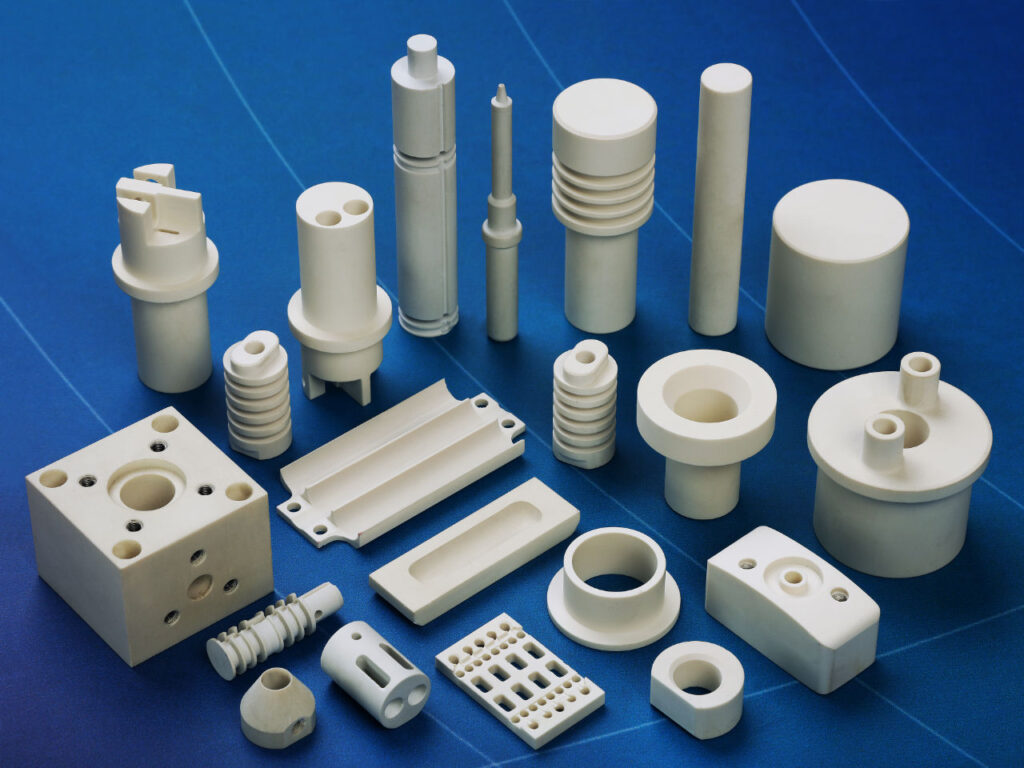
Shapal Hi M Soft
Machinable Aluminium Nitride
Shapal Machining
Shapal Hi M Soft is a hot-pressed material available in a variety of billet sizes; the largest being approximately 12″ x 12″ x 3.25″ (305mm x 305mm x 84mm). From slab form, it is cut into smaller blocks and machined into bars, tubes, disks, or other custom designs with very tight tolerances.
China Ceramic Parts is a Tokuyama authorized distributor of Shapal Hi M soft and has more experience with this material than any other company in the world. We can supply Shapal in blocks, bars, rods, plates, or custom machined parts from our facility that has been optimized for high tolerance ceramic production.
China Ceramic Parts is your Shapal machining specialist for your technical ceramic prototyping & manufacturing needs. We are happy to provide help on materials, design, and application. If you are looking for a supplier of machinable Aluminum Nitride components or would like to buy Shapal, please contact us and one of our experts will be happy to assist you.
Frequently Asked Questions
- What's the difference between Macor and Shapal?
Shapal Hi M Soft and Macor glass ceramic are often compared because they both are machinable ceramics, however, both of these materials have significantly different mechanical and thermal properties. The following are som factors to consider when choosing between Macor and Shapal.
Thermal Conductivity
Shapal Hi M is a thermal conductor at 90 W/(m K), Macor is a thermal insulator with a thermal conductivity of 1.46 W/(m K)
Thermal Cycle
Shapal is not prone to suffering from thermal shock failures while Macor is vulnerable to thermal shock – if the parts have rapid heat up and cool down cycles then Shapal is a better option.
Maximum Temperature
Shapal has a much higher maximum use temperature of 1900C (in an inert atmosphere) and 1000C (in air).
Strength
Shapal offers better bending strength (300 vs 94 MPa) as well as better compressive strength ( 1200 vs 345 MPa) when compared with Macor.
Cost
Macor is a cheaper material that Shapal Hi M Soft, if it can be used instead of Shapal the user will typically see significant cost reductions.
- What are the advantages of Shapal?
Shapal Hi M Soft™ is a hybrid type of machinable Aluminum Nitride ceramic that offers high mechanical strength and thermal conductivity. By combining Aluminum Nitride with Boron Nitride, Tokuyama has created a ceramic that is easily machined into complex shapes while still keeping many of the advantages of traditional Aluminum Nitride. It features excellent machinability, high thermal conductivity and excellent mechanical strength which makes it suitable for a broad range applications. Some other benefits of Shapal include:
- Can be machined by a broad range of methods such as drilling, turning, milling to form complex shapes with high precision
- Excellent sealing ability to vacuum
- Approximately five times as much thermal conductivity as that of alumina (Aluminium Oxide)
- High mechanical strength & bending strength of 30kg/mm² is comparable to that of Alumina
- Excellent electric insulation
- Low thermal expansion
- Low dielectric loss
- What can Shapal be used for?
Shapal Hi M Soft™ is a hybrid type of machinable Aluminum Nitride ceramic that offers high mechanical strength and thermal conductivity. It features excellent machinability, high thermal conductivity and excellent mechanical strength which makes it suitable for a broad range applications, such as the following:
- Electronic components where electrical insulation and heat dissipation are required
- Components where low dielectric constant and dissipation factor are required
- Fixture parts where a low coefficient of thermal expansion is required
- Vacuum components
- Components where a low coefficient of thermal expansion required
- Heat sinks
- Crucibles for vacuum deposition
- Special refractory parts such as protective tubes
- What's the difference between Shapal and Aluminum Nitride?
Pure Aluminum Nitride is often the material of choice for high thermal conductivity applications, however, because it is such a hard material it is often costly to produce in small quantities or non-standard sizes. Shapal Hi M Soft is a machinable Aluminum Nitride/Boron Nitride composite material that can be machined into incredibly tight tolerances and complicated shapes while still providing excellent thermal conductivity.
- What is the maximum size of Shapal I can purchase?
We have recently been able to increase the maximum size availability of Shapal to 300mm x 300mm x 64mm. We carry many standard sizes of Shapal in stock and can supply fully machined components or non-standard sizes on request.
- What is the maximum working temperature of Shapal Hi M Soft?
Shapal can be used at temperatures up to 1,900°C in an inert atmosphere and up to 1,000°C in an oxidizing atmosphere. Click Here for further information.

